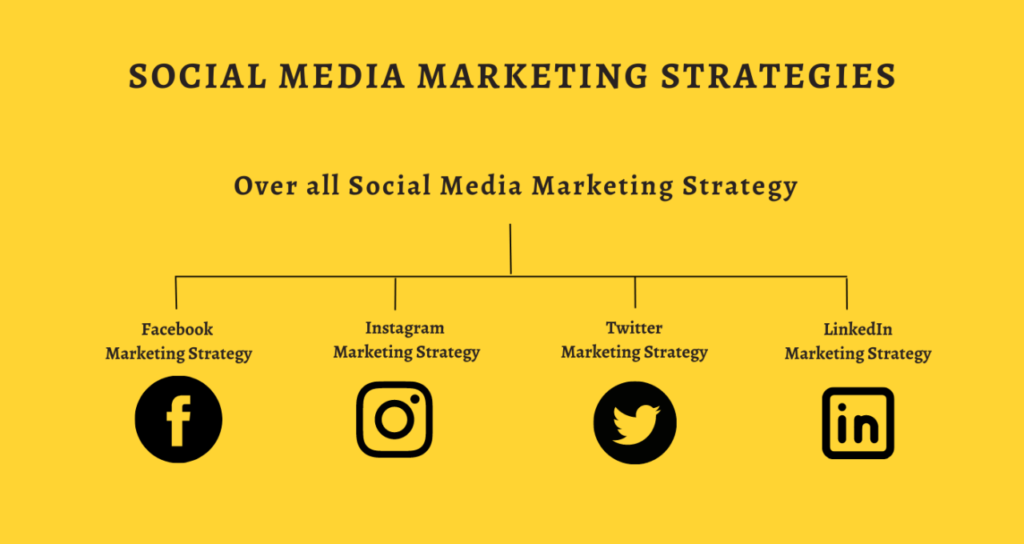
In the current business environment, having a robust social media presence is essential for companies aiming to broaden their reach and cultivate significant relationships with their audience. B2C (business-to-consumer) companies have utilized social media for a long time, but B2B (business-to-business) companies are now also realizing the potential of these platforms. Nevertheless, a strategic approach is necessary for successfully maneuvering through social media in the B2B context. In this blog post, we will delve into the components of a B2B social media marketing strategy, the reasons for its effectiveness, and how to develop a customized approach for your business.
What is Social Media Marketing Strategy for B2B?
A B2B social media marketing strategy is a planned approach that companies use to promote their products or services to other businesses via social media platforms. B2B social media marketing, in contrast to B2C marketing that aims at individual consumers, focuses on reaching industry influencers, decision-makers, and other businesses. The aim is to cultivate brand recognition, engage prospective customers, foster relationships, and eventually produce leads.
A robust B2B social media strategy comprises these essential components:
- Choosing the right platform: Certain social media platforms are not appropriate for B2B marketing. For B2B interactions, platforms such as LinkedIn, Twitter, and YouTube are often more effective than Instagram or TikTok.
- Content creation: The shared content should align with the business needs of the target audience. In B2B social media marketing, case studies, white papers, industry insights, and educational videos are frequently utilized.
- Targeted campaigns: To draw in the right businesses or decision-makers, ads and posts should be precisely targeted.
- Engagement: B2B social media marketing centers on relationship-building and dialogue with clients, rather than just sales.
Does Social Media Work for B2B?
Indeed, social media definitely functions for B2B marketing. Although it might appear that social media primarily serves as a platform for B2C brands to engage with individual consumers, B2B companies can also gain considerable advantages from having a robust social media presence.
Below are several explanations for the effectiveness of social media in B2B marketing:
- Enhanced brand visibility: Businesses can utilize social media platforms to present their products, services, and expertise to a broad and varied audience. This is essential in the competitive B2B arena.
- Establishing authority and thought leadership: By sharing useful content like blog articles, industry updates, and expert insights, you can establish your brand as a reliable leader in your industry.
- Networking opportunities: Platforms such as LinkedIn offer a distinctive chance to connect with other businesses, potential customers, and industry leaders, promoting collaboration and partnership possibilities.
- Lead generation: Social media allows B2B companies to interact directly with prospective clients, aiding in the generation of leads and the development of relationships.
- Targeted advertising: Social media platforms provide advanced targeting options that enable businesses to reach the appropriate audience, including decision-makers, procurement officers, and business owners.
Research indicates that 75% of B2B buyers rely on social media to guide their purchasing choices, underscoring the necessity of a robust social media presence for B2B companies.
How to Do a Social Media Marketing Strategy for B2B
There are several steps to take in order to create an effective B2B social media marketing strategy that will help you make the most of your efforts and reach your business goals.
Establish Clear Goals
The initial step involves clarifying what you aim to accomplish with your social media marketing strategy. You should ensure that your goals are in line with your business objectives. Typical objectives for B2B firms include:
- Enhancing recognition of the brand
- Lead generation
- Establishing expert status
- Attracting visitors to the website
- Encouraging customer connections
Recognize Your Intended Audience Grasp who you aim to connect with and customize your content to satisfy their requirements. B2B social media marketing typically targets business decision-makers, including CEOs, marketing directors, and procurement managers.
Select Suitable Platforms
Various social media platforms differ in their effectiveness for B2B marketing. While LinkedIn is regarded as the premier B2B platform, Twitter and YouTube can also prove beneficial for specific industries. It is vital to choose platforms that your target audience visits regularly.
Produce Captivating Material
Create content that aligns with the needs, challenges, and aspirations of your audience. This might encompass thought leadership articles, whitepapers, case studies, infographics, and instructional videos. Instead of merely promoting sales content, strive to offer value and insights to your audience.
Being consistent is crucial.
To keep up your visibility and audience engagement, it’s essential to stick to a consistent posting schedule. Establish a content calendar to guarantee the regularity and relevance of your posts.
Measure and Enhance
Utilize analytics tools to monitor your campaigns’ performance and evaluate what is effective and what is not. Utilize insights from these metrics to fine-tune your strategy and enhance upcoming campaigns.
Engage and Interact
As social media allows for two-way communication, it is crucial to interact with your audience by replying to comments, addressing inquiries, and starting discussions. This contributes to trust-building and relationship strengthening.

What Are the 4 C’s of B2B Marketing?
The 4 C’s of B2B marketing are essential guidelines to consider when developing your social media marketing strategy. These principles emphasize customer-centric strategies that hold particular significance for B2B marketing.
Customer
It is essential to put first the requirements and challenges of the businesses you aim to reach in your B2B marketing strategy. Comprehend the difficulties they are encountering, and present your offering as the answer.
Cost
In B2B contexts, considerations of cost often encompass more than just the price of a product or service. It is necessary to demonstrate the value of your offering as well as its potential for cost savings or efficiency improvements for your clients.
Convenience
Ensure the customer journey is as smooth as possible. This encompasses offering easy access to information, a seamless purchasing process, and outstanding customer support. Your business should leverage social media to enhance its accessibility for clients.
Communication
Effective communication plays a crucial role in B2B relationships. Utilize social media to create consistent communication with your clients, share updates, and provide insights that may be advantageous for them.
What Is the Best Social Media Marketing Strategy for B2B?
The optimal social media marketing strategy for B2B will differ based on your industry, target audience, and business objectives. Nonetheless, the ensuing best practices can be universally applied to develop an effective B2B strategy:
Nutze LinkedIn
LinkedIn ist die bevorzugte Plattform für B2B-Marketing. As the most professional social network, it is perfect for linking up with professionals and decision-makers. Establish a company page, disseminate useful content, engage in LinkedIn groups, and utilize LinkedIn Ads to aim for particular companies or job titles.
Utilize Thought Leadership Content
In B2B, credibility and trust are paramount. Share content that is insightful and thorough, showcasing your expertise and leadership in thought. This might encompass case studies, white papers, research reports, and webinars.
Utilize Paid Social Media Ads
Although organic social media content plays a crucial role, paid social media campaigns can boost lead generation initiatives. Utilize paid campaigns to focus on particular industries, job titles, or companies that match your ideal customer profile.
Emphasis on Lead Generation
The main focus of B2B social media marketing is often lead generation. Encourage prospects to share their information by using clear calls to action, lead capture forms, and gated content such as eBooks or case studies.
Put money into video marketing
Videos represent one of the most captivating varieties of content. From displaying your merchandise and offering customer reviews to delivering instructional material, videos enliven your brand and message.
What Are the 7 P’s of B2B Marketing?
A collection of strategic components that companies can utilize to steer their marketing endeavors constitutes the 7 P’s of B2B marketing. This encompasses:
- Product: Make certain that your product or service satisfies the requirements of your intended business customers.
- Price: Provide pricing models that are competitive and correspond to the value of your offering.
- Place: Identify the channels (including social media platforms) that will be most effective for disseminating your message.
- Promotion: Employ a combination of digital marketing strategies to advertise your product, such as content marketing, paid advertisements, and social media.
- People: Concentrate on your client relationships and provide outstanding customer service and communication.
- Process: Optimize your business processes, encompassing everything from lead generation to post-sale support, to guarantee efficiency.
- Physical Evidence: Demonstrate your brand’s trustworthiness through client endorsements, case studies, and success narratives.
Conclusion
To succeed, a social media marketing strategy for B2B must be well-considered and in line with your business objectives, target demographic, and brand identity. You can enhance brand awareness, generate leads, and cultivate robust connections with other companies by concentrating on the appropriate platforms, producing high-quality content, and regularly interacting with your audience. With the ongoing evolution of the B2B landscape, effective use of social media will aid in maintaining your competitiveness and establishing your brand for enduring success.
Following the steps detailed in this blog while considering the 4 C’s and 7 P’s of B2B marketing will enable you to develop a social media strategy that yields measurable outcomes and supports your business’s success in the digital age.